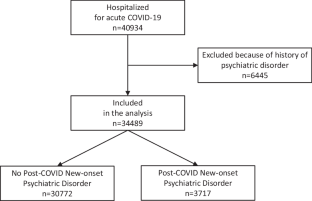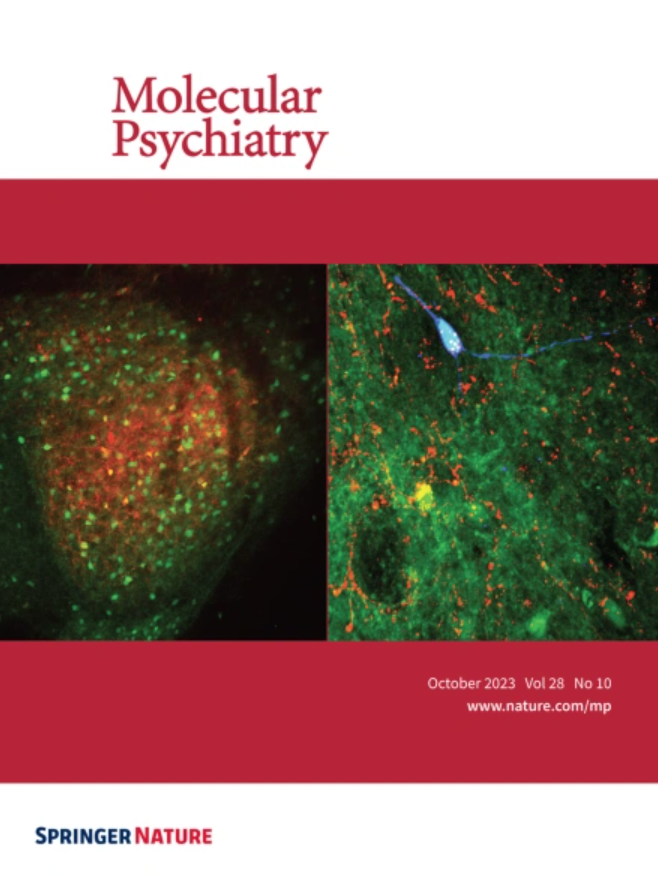急性 COVID-19 严重性标志物可预测 COVID 后新发精神障碍:对 34 489 名患者进行的为期两年的队列研究
IF 9.6
1区 医学
Q1 BIOCHEMISTRY & MOLECULAR BIOLOGY
引用次数: 0
摘要
COVID-19 后经常出现新发精神障碍。我们旨在确定急性 COVID-19 严重性标志物是否能预测 COVID 后新发精神障碍。我们对因 COVID-19 住院且无任何已知精神病史的患者进行了一项电子健康记录(EHR)队列研究。患者于 2020 年 1 月至 2022 年 9 月期间被纳入巴黎公共援助医院(Assistance Publique - Hôpitaux de Paris)的 36 所大学医院之一。在 COVID-19 住院期间记录了急性 COVID-19 的临床和生物学严重程度指标。记录了COVID-19住院2年9个月后的精神病ICD-10诊断。根据 Cox 回归模型和敏感性分析确定了 COVID 后新发精神障碍的预测因素。建立了预测分数,并在按年龄和性别分类的人群中进行了测试。共纳入了 34,489 名因 COVID-19 而住院的患者,其中 3717 名患者(10.8%)至少患有一种 COVID 后新发精神障碍。住院>7天(HR = 1.72,95%CI [1.59-1.86],p <0.001)、急性谵妄(HR = 1.49,95%CI [1.28-1.74],p <0.001)、单核细胞计数升高(HR = 1.14,95%CI [1.06-1.23],p <0.001)和血浆CRP升高(HR = 0.92,95%CI [0.86-0.99],p = 0.04)可独立预测COVID后新发精神障碍。敏感性分析证实,住院 7 天、急性谵妄和单核细胞计数升高是预测因素。基于这些变量的预测评分具有良好的 12 个月阳性预测值,在 65 岁女性中,其准确性是随机预测值的 7.5 倍。总之,COVID-19急性期的住院>7天、急性谵妄和单核细胞计数升高可预测COVID后新发精神障碍。本文章由计算机程序翻译,如有差异,请以英文原文为准。


Acute COVID-19 severity markers predict post-COVID new-onset psychiatric disorders: A 2-year cohort study of 34,489 patients
New-onset psychiatric disorders are frequent after COVID-19. We aim to determine whether acute COVID-19 severity markers can predict post-COVID new-onset psychiatric disorders. We conducted an electronic health records (EHR) cohort study of patients hospitalized for COVID-19 and without any known history of psychiatric disorders. Patients were included between January 2020 and September 2022 in one of the 36 university hospitals of the Assistance Publique - Hôpitaux de Paris. Acute COVID-19 clinical and biological severity markers were recorded during hospitalization for COVID-19. Psychiatric ICD-10 diagnoses were recorded up to 2 years and 9 months after hospitalization for COVID-19. Predictors of post-COVID new-onset psychiatric disorders were identified based on Cox regression models and sensitivity analyses. Predictive scores were built and tested in age- and sex-stratified populations. A total 34,489 patients hospitalized for COVID-19 were included; 3717 patients (10.8%) had at least one post-COVID new-onset psychiatric disorder. Hospital stay >7 days (HR = 1.72, 95%CI [1.59–1.86], p < 0.001), acute delirium (HR = 1.49, 95%CI [1.28–1.74], p < 0.001), elevated monocyte count (HR = 1.14, 95%CI [1.06–1.23], p < 0.001) and elevated plasma CRP (HR = 0.92, 95%CI [0.86–0.99], p = 0.04) independently predicted post-COVID new-onset psychiatric disorders. Sensitivity analyses confirmed hospital stay >7 days, acute delirium, and elevated monocyte count as predictors. Predictive scores based on these variables had good 12-month positive predictive values, up to 7.5 times more accurate than random in women < 65 years. In conclusion, hospital stay >7 days, acute delirium, and elevated monocyte count during acute COVID-19 predict post-COVID new-onset psychiatric disorders.
求助全文
通过发布文献求助,成功后即可免费获取论文全文。
去求助
来源期刊

Molecular Psychiatry
医学-精神病学
CiteScore
20.50
自引率
4.50%
发文量
459
审稿时长
4-8 weeks
期刊介绍:
Molecular Psychiatry focuses on publishing research that aims to uncover the biological mechanisms behind psychiatric disorders and their treatment. The journal emphasizes studies that bridge pre-clinical and clinical research, covering cellular, molecular, integrative, clinical, imaging, and psychopharmacology levels.
 求助内容:
求助内容: 应助结果提醒方式:
应助结果提醒方式:


